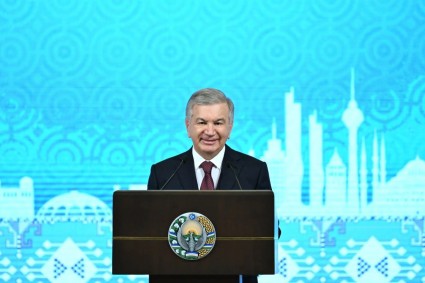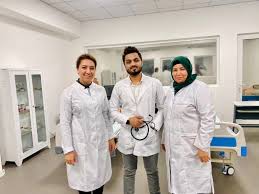On January 25, President of Uzbekistan Shavkat Mirziyoyev attended the conference call of Central Asian and Chinese leaders dedicated to the 30th anniversary of the establishment of diplomatic relations which was initiated by the President Xi Jinping.
The event was also attended by President of Kazakhstan Kasym-Jomart Tukayev, President of Kyrgyzstan Sadir Japarov, President of Tajikistan Emomali Rahmon and President of Turkmenistan Gurbanguly Berdimuhamedov.
The leaders summed up the results of 30 years of cooperation between the Central Asian states and China, exchanged views on topical issues of multilateral cooperation and priorities for the future.
Shavkat Mirziyoyev in his remarks congratulated the participants on the anniversary and underscored that the comprehensive strategic relations between Uzbekistan and China have been dynamic and stable over the past period.
Explaining the priorities of cooperation, Shavkat Mirziyoyev put forward an initiative to develop a new China - Central Asia economic dialogue strategy, aimed at ensuring barrier-free trade and the formation of a common space for industrial cooperation and localization.
He stressed the importance of developing systemic solutions to ensure uninterrupted flow of goods on the China-Central Asia route and the development of transregional logistics networks and was proposed to launch the China-Kyrgyzstan-Uzbekistan railway project in 2022.
Shavkat Mirziyoyev drew the attention of the summit participants to the need to unite efforts for the widespread introduction of digital technologies and proposed to create a joint platform "Intellectual Silk Road" on the basis of IT parks.
Shavkat Mirziyoyev outlined the cooperation in the field of health and the fight against infectious diseases as one of the important areas. He expressed readiness to continue cooperation with China in the development, testing and production of vaccines and Uzbekistan’s support to the mutual recognition of vaccination certifiates in order to facilitate the movement of people and goods between countries.
Shavkat Mirziyoyev touched upon the poverty reduction calling its solution the most important condition for ensuring the well-being of the public.
In this regard, Uzbekistan is interested in continuing cooperation with China on the modernization of the agricultural sector, the cultivation of crops in saline and saline soils, the establishment of production chains between urban and rural areas.
In addition, the President of Uzbekistan called for close cooperation in meeting the rapidly growing needs of the population in food during the pandemic and the implementation of urgent joint measures in this regard. It was proposed to jointly promote the initiative of the UN General Assembly to adopt a special resolution on food security in the event of a pandemic.
While, he also stressed the need to jointly promote the climate agenda in the framework of the construction of the Silk Road and put forward an initiative to develop a roadmap to ensure "eco-friendly development" aimed at accelerating investment and technological cooperation in the field of alternative energy.
He drew attention to the further rapprochement of the peoples of Central Asia and China, the expansion of cultural and humanitarian exchanges.
Shavkat Mirziyoyev proposed to declare next year the Year of Culture and Arts of the peoples of Central Asia and China, focusing on academic and student exchange programs, youth forums and sports competitions.
In his speech, the President of Uzbekistan also touched upon the issues of continuing cooperation in the field of regional security, underscoring the importance to continue to coordinate joint efforts in Afghanistan in order to implement the concept of the "Safe Silk Road".
In conclusion, the President wished the Chinese people a successful Winter Olympics in Beijing.
At the end of the summit, a joint statement was adopted, which reflected the common approaches to important issues of further strengthening the multifaceted partnership between the Central Asian states and China.















